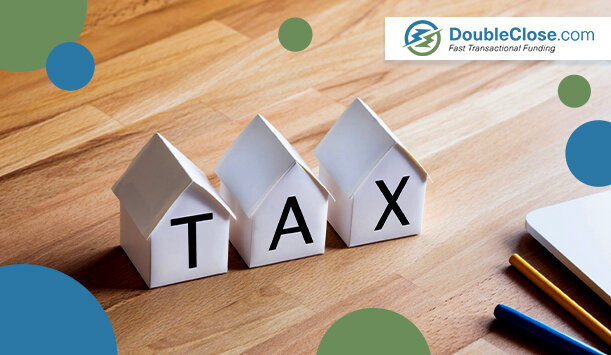
Investing in real estate can be incredibly profitable. Specifically, if you buy a property when it’s cheap and sell it after its value has increased, you’ll make tens if not hundreds of thousands in profit. But if you aren’t looking to invest in multiple properties at once, you can buy a property, rent it out, and use the rent money as passive income.
And if you invest in real estate, you’ll have to know which taxes are owed as well as what tax benefits apply to your business. That said, dealing with real estate taxes can be pretty overwhelming, even for an experienced investor.
In this article, we’ll walk you through everything you need to know about real estate taxes so you can stay clear of IRS troubles once your real estate investment company begins to grow.
The Taxes You’ll Pay When Investing In Real Estate
1. Property Taxes
Local and state governments both tax property owners, and these taxes are used to pay for schools, fire and police departments, and roads. The amount you pay in property tax depends on the property’s value and its location.
2. NIIT (Net Investment Income Tax)
If you’re a high net-worth individual who makes tons of money from buying and selling real estate, you’ll have to pay NIIT. To know more about NIIT and who has to pay it, visit the IRS’s website.
3. Real Estate Income Tax
The rental income you earn is taxed like regular income. To know what qualifies as passive income, take the material participation test on the IRS’s website. This test will determine if your income is passive or results from actively participating in a business.
4. Business Income Tax
In some cases, renting out real estate is not considered passive income. In such cases, the landlord is usually deemed to operate an active business. For example, if you run a bed and breakfast, this is considered an active business, so you’d have to pay income tax on any money made from it.
5. Capital Gains
When you sell a property for more than you bought it for, the difference is known as capital gains, which are also taxed. The rate at which this money is taxed depends on the type of capital gains in question. For example, are they long-term or short-term capital gains?
Short-term gains are gains made after selling an asset you’ve owned for less than a year. Short-term gains are taxed like ordinary income, while long-term gains are taxed at a lower rate.
6. Individual Income Taxes
If you’re a real estate investor who doesn’t own any property, any gains you make from your real estate transactions will be taxed as income.
Tax Benefits Of Real Estate Investing
Here are a few tax benefits associated with investing in real estate:
1. Lower Tax For Long-Term Capital Gains
The main goal for any property investor is to sell the property for more than it was purchased for. And if you sell a property after holding it for more than a year, you won’t have to pay as much in taxes on it, as the long-term capital gains rate is lower than the short-term rate.
2. Claiming Depreciation
When renting out properties or using real estate to conduct your business, you can write off property depreciation and reduce your tax bill. The IRS has different depreciation periods, and which period applies depends on the kind of property you have. The depreciation period for residential properties is 27.5 years, while the commercial property depreciation period is 39 years. So, if you’re renting a single-family unit you purchased for $100,000, you can claim depreciation deductions worth $3,636 annually.
3. Rental Income Is Not Earned Income
Unlike salary or self-employment income, the rent you earn from your real estate investments isn’t subject to Medicare or Social Security taxes. This means if you brought in a rental income of $30,000 one year, you wouldn’t have to pay self-employment or FICA taxes on it.
Wrapping Up
As you can see, real estate investing requires paying more taxes, but there are also tax advantages. That said, figuring out which taxes you’re subject to as an owner and capitalizing off every tax advantage can be challenging. This is why you should work with a trusted tax expert, as they’ll prepare your tax returns and help you avoid any troubles with the IRS. And if you want to purchase a property but don’t have the capital to do so, contact a transactional lender who can provide a short-term loan. At DoubleClose.com, we offer double close wholesale real estate funding to investors who need funding to close a deal quickly. Contact us to learn more about double closing and how it can help you avoid hefty real estate taxes.
